FOCAC | Embarking on a New Journey Together from FOCAC: Renewable Energy Development Boosts Green Future of China-Africa Cooperation
During the recently concluded Forum on China-Africa Cooperation Summit (FOCAC Summit), China and Africa reached important consensus in multiple fields, further deepening the friendly and strategic partnership between the two sides. The green transition has become a new highlight of China-Africa cooperation, bringing new opportunities for energy collaboration between China and Africa.
To promote information sharing and better meet the demand from both sides, while exploring new measures and opportunities to advance green energy cooperation in achieving green low-carbon transition, the Belt and Road Initiative International Green Development Coalition (BRIGC) initiated by the Ministry of Ecology and Environment, and the World Resources Institute (WRI) jointly organized the"Green Path Ahead for China-Africa Cooperation” workshopin Beijing on September 13.
The workshop is dedicated to briefing on the recently concluded FOCAC. More than 30 representatives from institutions including the National Development and Reform Commission's Belt and Road Initiative Center, China Renewable Energy Engineering Institute, Ministry of Ecology and Environment's Foreign Environmental Cooperation Center, African embassies in China, African financial institutions and enterprises, international think tanks joined the event. The meeting was chaired byBRIGC's Chief Development Officer Zhang Jianyu. WRI China’s Director of the Sustainable Transition Center Miao Hong delivered the opening speech.

In her speech, Miao Hong mentioned that the ten partnership actions announced at the summit, as well as the important outcome documents jointly released by China and Africa such as the "Beijing Declaration" (the Beijing Declaration on Jointly Building an All-Weather China-Africa Community with a Shared Future for the New Era) and the"Beijing Action Plan" (Forum on China-Africa Cooperation Beijing Action Plan (2025-2027), have pointed the way for future green energy cooperation between China and Africa.Promoting energy access and energy transition in the African region is one of WRI's key tasks. By conducting joint research and project cooperation with stakeholders from China, Africa, and international institutions, WRI provides technical support and financing solutions for Africa's energy transition. Together with various partners, WRI has launched theChina-Africa Renewable Energy Sustainable Investment PartnershipBefore the summit, WRI supported the leading institutions of the partnership in signing a memorandum of understanding in Kenya. Additionally, WRI has provided technical and solution support for the Ministry of Ecology and Environment's"Africa Solar Belt Program" and continues toexplore financial risk mitigation toolsto facilitate renewable energy financing channels and promote the implementation of more renewable energy projects.
The Summit Injects New Momentum into Renewable Energy Cooperation
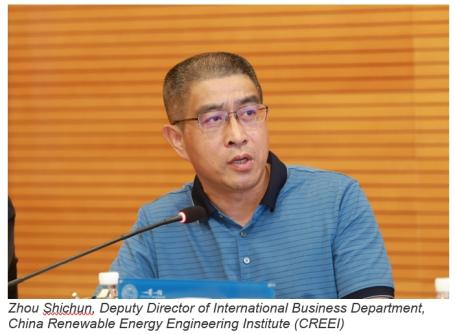
Zhou Shichun pointed out that energy cooperation is an important area of collaboration between China and African countries. Each summit has highly valued and emphasized energy cooperation, incorporating energy resources cooperation into action plans. Specifically, China is willing to help Africa build a "green growth engine", narrow the energy accessibility gap, and commit toimplementing 30 clean energy projects in Africa. In the future, China will continue to utilize platforms and mechanisms such as the China-AU Energy Partnership, the China-Africa Energy Innovation Cooperation Accelerator Project, and the China-Africa Energy Cooperation Project Promotion Meetingto strengthen exchanges and project matchmaking, support African countries in formulating investment policies, encourage the establishment of joint ventures, and facilitate the implementation of more renewable energy projects in Africa.
"Africa Solar Belt Program" Initiates a New Chapter of China-Africa
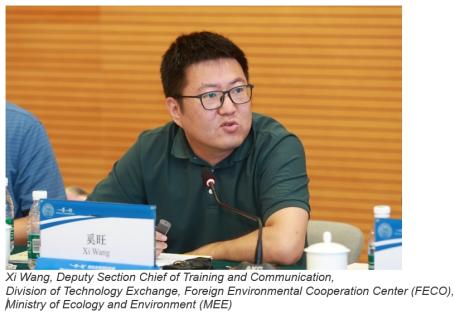
Xi Wang mentioned that as of now, China has signed 19 South-South cooperation memorandums of understanding on climate change with 17 African countries, jointly released the "China-Africa Cooperation Declaration on Climate Change", and initiated a special three-year action plan for China-Africa cooperation on climate change. The "Africa Solar Belt Program” is a key development. Currently, China has signed cooperation memorandums of understanding with four African countries. The next step is to collaborate with international organizations, research institutions, industry associations, and other stakeholders to participate in the "African Light Belt" project,focusing on policy research and industrial planning for photovoltaic development in urban areas and industrial/economic parks based on the cooperation needs of African countries.By means of "material assistance + exchanges and dialogues + joint research + capacity building", the project aims to expand its influence. Government departments, banks, financial institutions, new energy vehicle companies, and international think tank representatives from Malawi, Nigeria, Kenya, Zimbabwe, and other African countries, along with Chinese institutions, had in-depth discussions on the broad opportunities, potential challenges, and future cooperation plans for China-Africa green cooperation under the new situation.
Highlights from the Open Floor Discussion
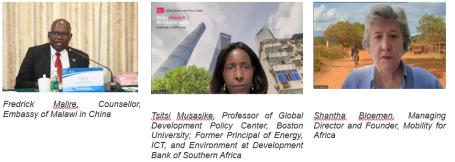
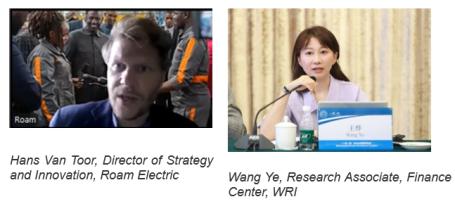
Source: BRIGC
The participants unanimously agreed that green energy development is crucial for African countries.By combining the development of green energy such as solar and wind energy with the localization of electric vehicle industries, they can effectively address environmental pollution issues, promote economic development, and meet local energy needs.
Key Insights:
- Climate Challenges and Industrialization in Africa:In some African countries, traditional hydropower-dependent power systems face climate change challenges, and the modernization of African nations and cities brings greater energy demand.
- A path to China-Africa Win-win Cooperation:China's accumulated industrial experience, technological advantages, and financial innovation in renewable energy and green transportation can complement African local enterprises, offering great cooperation potential.
- Funding Challenges:The future of China-Africa energy cooperation is promising, but funding challenges remain. African renewable energy project development lacks sufficient and effective funding support mechanisms during the pre-feasibility stage, making projects difficult to finance. Existing funding mechanisms have limited funding, long approval times, and inadequate efficiency evaluation mechanisms.
- Enhance Project Bankability:Improving the financing viability of African renewable energy projects requires building broader partnerships, enhancing international public funding support, and strengthening technical capacity building. It also needs to assist African countries in strengthening cross-departmental cooperation among stakeholders in climate change, energy, transportation, and other fields.
- Integrated Energy Planning:Ensuring that energy planning is closely integrated with other sectors to genuinely assist local economic development and improve people's livelihoods. This also involves enhancing the absorption capacity for renewable energy, providing positive signals to investors, supporting project decision-making, and advancing the greening of Africa's industrial processes.

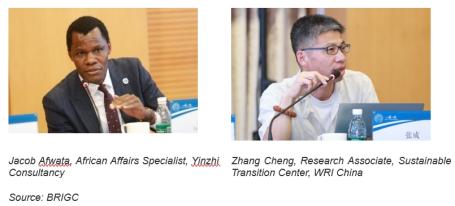
Additionally, the participants expressed their expectations for accelerating China-Africa green cooperation from perspectives such aspromoting technology transfer, financial tool innovation, and green industry layout:
- Policy Dialogue and Practical Cooperation:Continue to strengthen China-Africa policy dialogue, experience sharing, capacity building, and practical cooperation to enhance mutual understanding and identify the policy, financial, and technical needs of African countries for green energy transition.
- Innovative Funding Mechanisms and Business Models:Explore innovative financing mechanisms for small and beautiful climate-friendly projects, reduce the financing costs of renewable energy projects, and innovate commercial models to bridge Africa's green energy investment gap more rapidly.
- Sectoral Focus and Enhance bilateral cooperation to support localization of production in Africa:Focus on industries that meet Africa's development needs, such as green electricity + new energy vehicles, cross-regional grids, microgrids, and green manufacturing. Promote training on the demand side of energy use in the distributed power station model, strengthen full lifecycle management of emerging industries in Africa, and promote circular economy development. At the same time, encourage more Chinese enterprises to increase investment cooperation in Africa, support local production and processing industries in Africa, and integrate Africa into the global green industry chain.
The collaborative discussions at the meeting underscored the collective commitment to fostering a sustainable and greener future through China-Africa cooperation in renewable energy and green development.